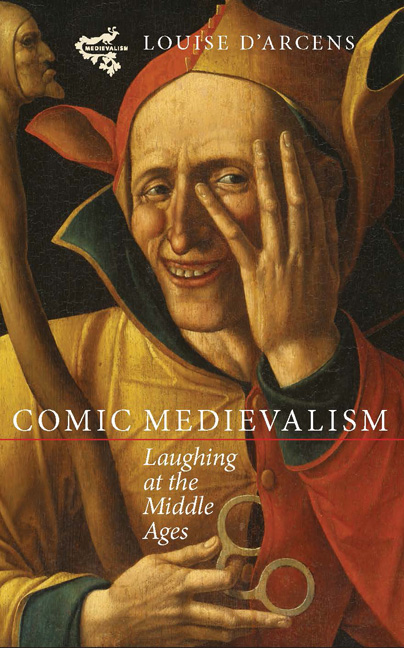Book contents
- Frontmatter
- Dedication
- Contents
- Illustrations
- Acknowledgements
- I THE SET UP
- II OLDIES BUT GOODIES: COMIC RECOVERY
- III HIT AND MYTH: PERFORMING AND PARODYING MEDIEVALISM
- IV THAT'S EDUTAINMENT: COMEDY AND HISTORY
- 6 ‘The Past is a Different and Fairly Disgusting Country’: The Middle Ages in Recent British ‘Jocumentary’
- 7 Smelling the Past: Medieval Heritage Tourism and the Phenomenology of Ironic Nostalgia
- Afterword: Laughing into the Future
- Bibliography
- Index
6 - ‘The Past is a Different and Fairly Disgusting Country’: The Middle Ages in Recent British ‘Jocumentary’
from IV - THAT'S EDUTAINMENT: COMEDY AND HISTORY
Published online by Cambridge University Press: 05 November 2014
- Frontmatter
- Dedication
- Contents
- Illustrations
- Acknowledgements
- I THE SET UP
- II OLDIES BUT GOODIES: COMIC RECOVERY
- III HIT AND MYTH: PERFORMING AND PARODYING MEDIEVALISM
- IV THAT'S EDUTAINMENT: COMEDY AND HISTORY
- 6 ‘The Past is a Different and Fairly Disgusting Country’: The Middle Ages in Recent British ‘Jocumentary’
- 7 Smelling the Past: Medieval Heritage Tourism and the Phenomenology of Ironic Nostalgia
- Afterword: Laughing into the Future
- Bibliography
- Index
Summary
The phrase used in the title of this chapter is taken from the back cover blurb of The Worst Jobs in History, the book accompanying the 2004 Channel 4 television series of the same name hosted by the actor, presenter and face of popular history in Britain, Tony Robinson (also known as ‘Baldrick’ in the famous BBC comedy series Blackadder, and host of Channel 4's long-running popular archaeology programme Time Team). The phrase is not the invention of the book's publishers but is Robinson's own, also featuring on the book's opening page. It is of interest for several reasons. First, and most obviously, it announces the series' comic disposition toward the past; Robinson assumes that audiences will recognise its parodic deflation of L. P. Hartley's terminally overused phrase ‘the past is another country’ and thereby register from the outset the series' determination to distance itself from the nostalgia and reverence for the past that have (arguably wrongly) been attached to Hartley's aphorism. Second, its introduction of the ironically modest modifier ‘fairly disgusting’ into the famous phrase is noteworthy not only because it forecasts the series' scatological preoccupation with the visceral and excremental dimensions of the past (a preoccupation also indicated in the promise that Tony will ‘get to the bottom (quite literally)’ of history), but also because it indicates that Robinson will be passing judgement on the past, exposing the reliance of past societies on the ‘disgusting’ exploitation of the poor and the vulnerable, whose meagre existence was eked out through humiliating, tedious, unsanitary and even dangerous occupations.
- Type
- Chapter
- Information
- Comic MedievalismLaughing at the Middle Ages, pp. 139 - 160Publisher: Boydell & BrewerPrint publication year: 2014



